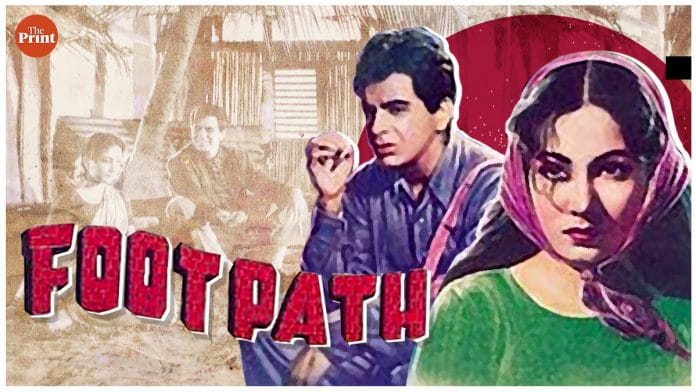New Delhi: “Jab log bhookh se mar rahe the, toh hum unke hisse ka anaj unche daamon mein bechkar humare khazane bhar rahe the. Jab sheher mein bimari faili, humne dawaiyaan chupa di, aur unke daam badha diye (When people were dying of hunger, we sold their share of ration at high prices to make money. When the disease took over the city, we hoarded medicine and increased the prices).”
This dialogue from the 1953 movie, Footpath, went viral on social media a few months ago after reports of people hoarding essential medicines and oxygen cylinders during the second wave of the pandemic surfaced.
What made people revisit this clip, apart from the memorable performance by legendary actor Dilip Kumar, is that it holds a mirror up to our society.
The movie Footpath was a representation of the challenges faced by a newly independent India, when people were still struggling with uncertainty about the future.
This week in Reel Take, ThePrint revisits Zia Sarhadi’s Footpath, starring Dilip Kumar and Meena Kumari, known as the tragedy king and queen of Hindi cinema.
A commentary on post-independence era
Footpath tells the story of a young man, Noshu (Dilip Kumar), who is split between idealism and the urge to create a bright and secure future for himself, which leads him to the world of black-marketing and wrongdoings.
Meena Kumari plays the role of Mala, Noshu’s love interest.
Noshu lives with his brother Bani (Romesh Thapar) and sister-in-law Meena (Achala Sachdev). Meena dislikes Noshu and thinks that he lives off their money. Noshu feels helpless as he is unable to make enough money through journalism and sometimes gets his salary once in four months.
Tired of humiliation, conflicts in the family, and lack of financial security, Noshu resorts to black marketing. He starts making money but little does he know the consequences it will have for those around him, including his brother and Mala, the love of his life.
The movie, however, has more elements than just tragedy and romance. It delivers a strong social message, showcases the dilemma between moral values and ambition, and offers a glimpse of the India of the 1950s.
Also read: Dilip Kumar was the First Khan of Bollywood, the Prince Salim of our hearts: Shobhaa De
Dilip Kumar shines through his acting
Dilip Kumar as Noshu convincingly portrays a young and idealistic man who deviates from his path, but still has his conscience intact. Even though Noshu indulges in black marketing, the journalist in him does not die, and that is why he decides to take upon the grain hoarders and black marketeers by writing about them using a pen name.
The movie shows several shades of Dilip Kumar — from a simple journalist to a millionaire who is filled with guilt.
The dialogues, relevant even in today’s era, and their piercing delivery by Dilip Kumar make the movie a remarkable watch.
Recently, actor Dharmendra shared a clip from the movie and wrote, “this was happening in 1952..something like this is even happening today”.
Despite her limited scenes, Meena Kumari too leaves a lasting impression. The playful and romantic exchange of dialogues between her and Dilip Kumar is endearing. It is a treat to watch Dilip Kumar in his romantic avatar. No wonder Shah Rukh Khan, hailed as the king of romance, says he takes inspiration from Dilip Kumar.
The songs of the film may not have been popular but are worth listening to. Music by Khayyam complements the pace of the film. Anwar Hussain, Achala Sachdev, Romesh Thapar and child actor Master Romi also deserve a mention for their performance.
Footpath is a must-watch for all, as a tribute to Dilip Kumar who passed away on 7 July, and to remember the legendary actor’s unparalleled charisma and dedication to his craft.
(Edited by Neha Mahajan)
Also read: ‘Kohinoor’, the 1960s gem that had Bollywood’s tragedy king & queen at their comical best






